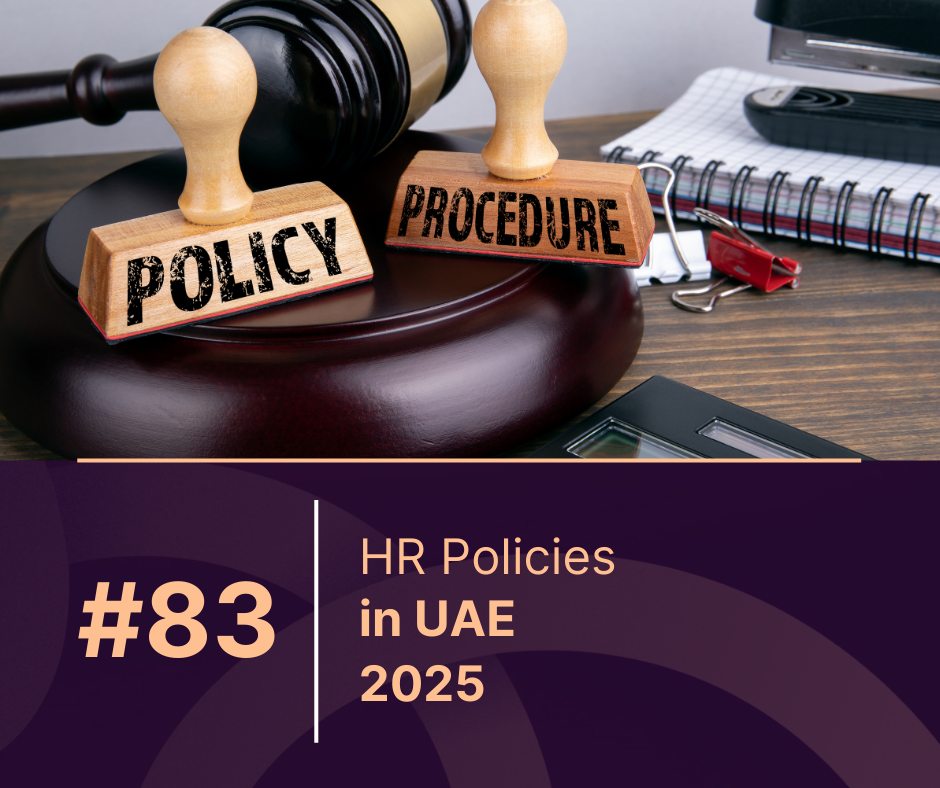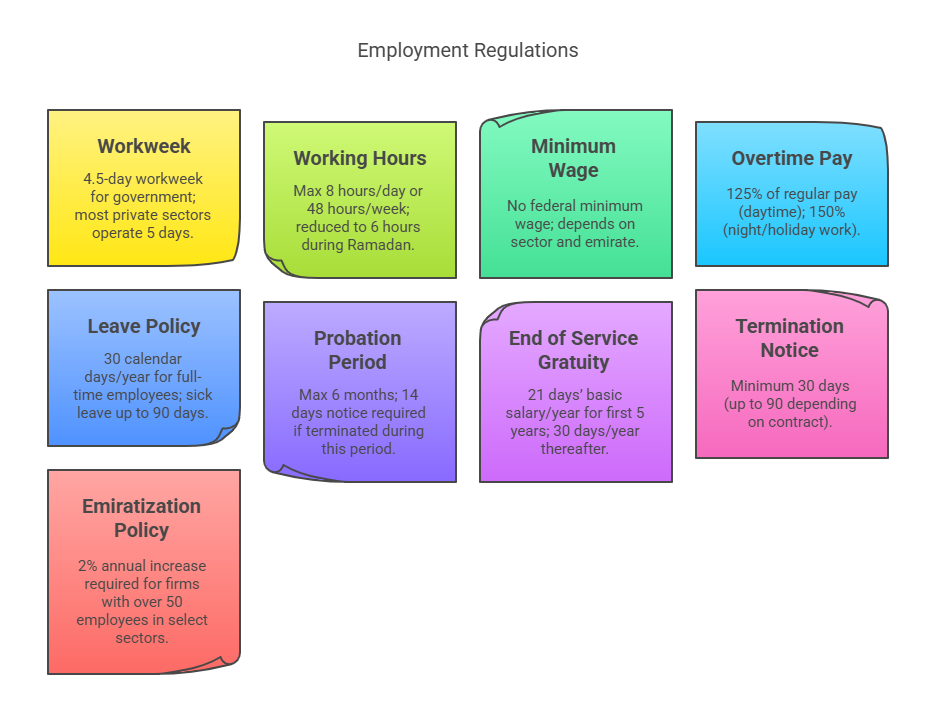The HR landscape in the United Arab Emirates is evolving rapidly. With new labor law reforms and tech integration, it’s crucial for employers and HR professionals to stay updated with the latest HR policies in UAE. This comprehensive guide provides an overview of the most important HR regulations for 2025, including hiring, employee benefits, working hours, and termination rules. Whether you’re a business owner, HR manager, or employee, this blog will help you navigate the dynamic world of UAE labor laws and HR practices.
What Are HR Policies in UAE?
HR policies in UAE refer to the structured set of guidelines that govern the employment relationship between organizations and their employees, in compliance with the UAE Labour Law (Federal Decree-Law No. 33 of 2021) and its updates. These policies ensure transparency, fairness, and legal compliance in areas such as:
-
Recruitment & contracts
-
Employee classification
-
Working hours & leave entitlements
-
End of service benefits
-
Employee rights & obligations
Key Components of HR Policies in UAE
Below is a breakdown of the critical components every employer should know:
| Policy Area | 2025 Regulations & Guidelines |
|---|---|
| Workweek | 4.5-day workweek for government; most private sectors operate 5 days |
| Working Hours | Max 8 hours/day or 48 hours/week; reduced to 6 hours during Ramadan |
| Minimum Wage | No federal minimum wage; depends on sector and emirate |
| Overtime Pay | 125% of regular pay (daytime); 150% (night/holiday work) |
| Leave Policy | 30 calendar days/year for full-time employees; sick leave up to 90 days |
| Probation Period | Max 6 months; 14 days notice required if terminated during this period |
| End of Service Gratuity | 21 days’ basic salary/year for first 5 years; 30 days/year thereafter |
| Termination Notice | Minimum 30 days (up to 90 depending on contract) |
| Emiratization Policy | 2% annual increase required for firms with over 50 employees in select sectors |
HR Policy Compliance for Businesses
Employers operating in the UAE must ensure their HR practices align with the latest legal framework. Non-compliance with HR policies in UAE may result in fines, legal disputes, and damage to the company’s reputation. To remain compliant in 2025:
-
Regularly audit HR documentation
-
Train HR teams on labor law changes
-
Implement HRMS tools to track leave, benefits, and contracts
-
Promote Emiratization to meet government mandates
Important Changes to HR Policies in UAE for 2025
Here are the notable policy shifts taking effect or continuing in 2025:
-
Emiratization penalties: AED 96,000 per non-compliant position annually
-
New types of employment contracts: Includes part-time, temporary, and freelance roles
-
Flexible working models: Businesses encouraged to adopt hybrid and remote work options
-
Gender equality enforcement: Equal pay for equal work now enforced across all industries
These updates reflect the UAE’s push towards a modern, flexible, and equitable workforce structure.
Best Practices for HR Managers in the UAE
To streamline compliance and employee satisfaction, HR professionals should:
-
Develop clear onboarding policies
-
Digitize employee records and contracts
-
Monitor working hours and overtime reports
-
Promote diversity and inclusion
-
Stay updated on HR policies in UAE through MOHRE (Ministry of Human Resources & Emiratisation)
Why Understanding HR Policies in UAE Matters
-
Avoid Legal Risks: Aligning with regulations reduces penalties and lawsuits
-
Boost Employee Morale: Clear policies ensure fairness and consistency
-
Improve Productivity: Proper work-life balance boosts motivation
-
Enhance Employer Branding: Compliant and fair workplaces attract top talent
Conclusion
The evolving HR policies in UAE are reshaping the way businesses operate and manage human resources. With increased focus on compliance, technology, and employee well-being, it’s more important than ever to stay informed. This guide serves as a foundation for aligning your HR strategy with the law and building a future-ready workplace in 2025 and beyond.
FAQs
1. What is the legal probation period in UAE in 2025?
The probation period is limited to a maximum of 6 months. Employers must give 14 days’ notice before termination during probation.
2. Are there different HR policies for public and private sectors in the UAE?
Yes. Public sector follows a 4.5-day workweek, while most private sector companies still follow a 5-day structure.
3. How are end-of-service benefits calculated in the UAE?
For employees completing more than one year, it’s 21 days of basic pay per year for the first 5 years, then 30 days per year thereafter.
4. Is remote working allowed under HR policies in UAE?
Yes. The UAE encourages flexible work models including remote and hybrid setups, especially in private sectors.
5. Where can I find official updates on HR policies in UAE?
Visit the MOHRE official website or consult legal professionals for updated labor laws and policies.




